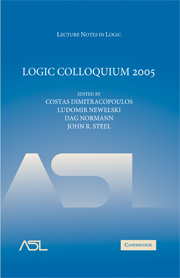Book contents
- Frontmatter
- Contents
- Introduction
- Speakers and Titles
- Thread algebra and risk assessment services
- Covering definable manifolds by open definable subsets
- Isomorphisms and definable relations on computable models
- Independence for types in algebraically closed valued fields
- Simple groups of finite Morley rank
- Towards a logic of type-free modality and truth
- Structural analysis of Aronszajn trees
- Proof analysis in non-classical logics
- Paul Bernays' later philosophy of mathematics
- Proofnets for S5: Sequents and circuits for modal logic
- Recursion on the partial continuous functionals
- A transactional approach to the logic of truth
- On some problems in computable topology
- Monotone inductive definitions and consistency of New Foundations
- LECTURE NOTES IN LOGIC
Independence for types in algebraically closed valued fields
Published online by Cambridge University Press: 18 December 2009
- Frontmatter
- Contents
- Introduction
- Speakers and Titles
- Thread algebra and risk assessment services
- Covering definable manifolds by open definable subsets
- Isomorphisms and definable relations on computable models
- Independence for types in algebraically closed valued fields
- Simple groups of finite Morley rank
- Towards a logic of type-free modality and truth
- Structural analysis of Aronszajn trees
- Proof analysis in non-classical logics
- Paul Bernays' later philosophy of mathematics
- Proofnets for S5: Sequents and circuits for modal logic
- Recursion on the partial continuous functionals
- A transactional approach to the logic of truth
- On some problems in computable topology
- Monotone inductive definitions and consistency of New Foundations
- LECTURE NOTES IN LOGIC
Summary
Introduction: the historical context. My goal in this article, as it was in the lecture at the Logic Colloquium in Athens, is to survey the notion of independence of types, a fundamental tool in the area of stability theory, and see different ways in which it can be realized in a particular example of an unstable theory, the theory of algebraically closed valued fields. I thank the anonymous referee for many comments which have significantly improved this article. Of course, all remaining errors are my own.
The notion of independence was first formulated by Shelah [Sh] in the 1970's in the context of classification theory. The motivating problem was the following.
problem. Given a theory T and a cardinal λ > |T|, let I (T, λ) be the number of models of T of cardinality λ, up to isomorphism. What can the function I (T, λ) be?
The first observation is that there is the following fundamental dichotomy.
Suppose T is unstable; that is, for every uncountable λ there is a parameter set A with |A| ≤ λ such that the number of types over A is 2λ. In this case, I (T, λ) = 2λ; the maximum possible value.
Suppose T is stable. Then there are different possibilities for I (T, λ), so one can look for further conditions on the theory which will serve to determine the value that I (T, λ) takes.
- Type
- Chapter
- Information
- Logic Colloquium 2005 , pp. 46 - 56Publisher: Cambridge University PressPrint publication year: 2007



